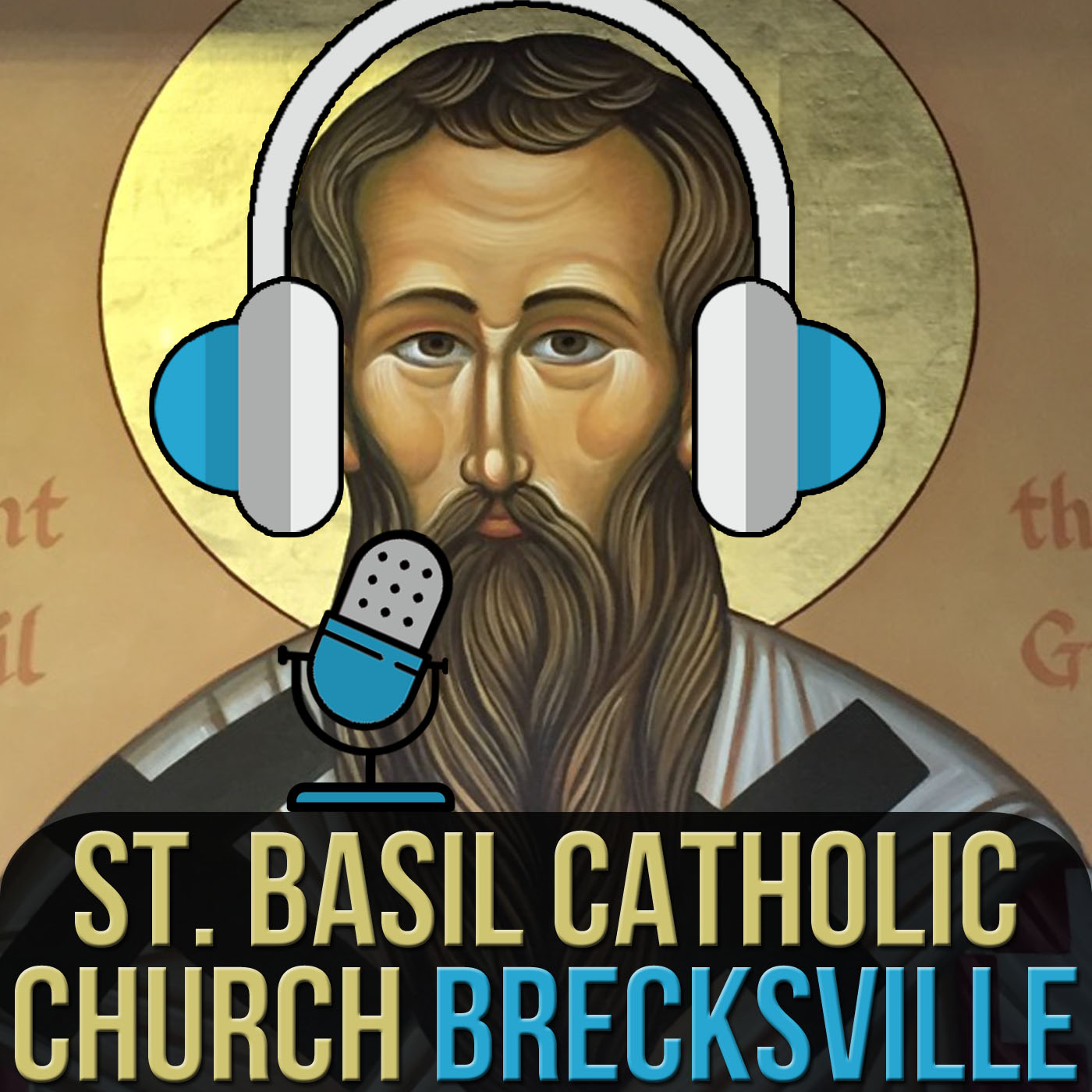Episodes
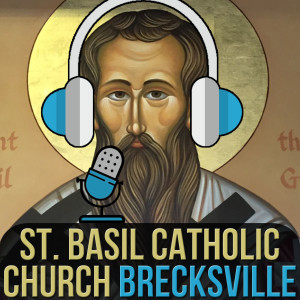
Wednesday Apr 28, 2021
190. Fill These Hearts - Book Insight
Wednesday Apr 28, 2021
Wednesday Apr 28, 2021
Tommy Dome shares from the book Fill These Hearts by Christopher West, available on Amazon.
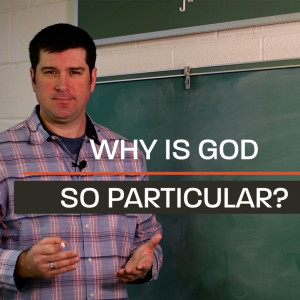
Friday Feb 26, 2021
179. Why is God so particular?
Friday Feb 26, 2021
Friday Feb 26, 2021
In the Old Testament and New Testament, God the Father and Jesus give very specific instructions for things. What's the big deal? What can we learn from this?
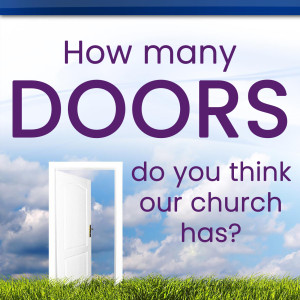
Friday Nov 20, 2020
152. How many DOORS do you think our church has?
Friday Nov 20, 2020
Friday Nov 20, 2020
There are many ways in....but try this one.
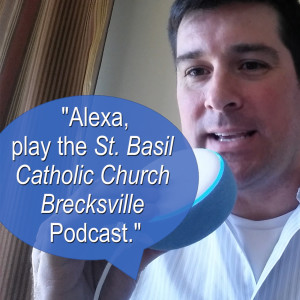
Tuesday Nov 10, 2020
150. Podcast available on Amazon Alexa devices!
Tuesday Nov 10, 2020
Tuesday Nov 10, 2020
"Alexa, play the St. Basil Catholic Church Brecksville Podcast." The St. Basil Catholic Church Brecksville Podcast is now available on any Alexa-enabled devices. EEAASSYY
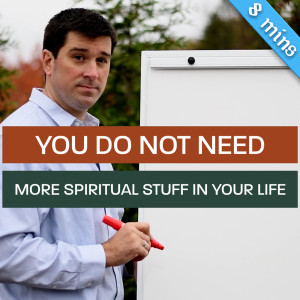
Friday Oct 30, 2020
146. You Do Not Need More Spiritual Stuff in Your Life
Friday Oct 30, 2020
Friday Oct 30, 2020
Two perspectives on how we view the stuff of life.
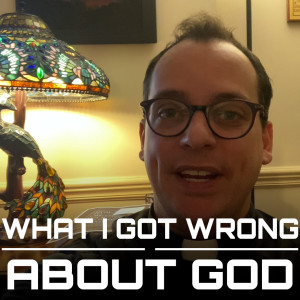
Wednesday Oct 21, 2020
144. What is the Perfect Prayer?
Wednesday Oct 21, 2020
Wednesday Oct 21, 2020
3 possible answers offered.....

Thursday Oct 08, 2020
140. 2 of My Fave Religious Poems
Thursday Oct 08, 2020
Thursday Oct 08, 2020
Parish Staff Member Tommy Dome shares 2 of his favorite religious poems.
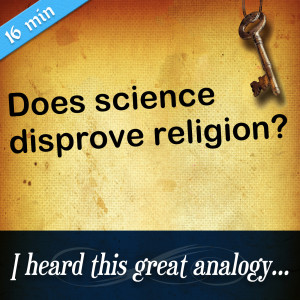
Friday Feb 21, 2020
107. I Heard this Great Analogy - Does Science disprove Religion?
Friday Feb 21, 2020
Friday Feb 21, 2020
Do faith and science contradict? Can a scientist still be a believer? Can Metal Detector Guy save the day at the beach? Tune in to hear about great Catholic scientists from last millennium, last century, and last year.
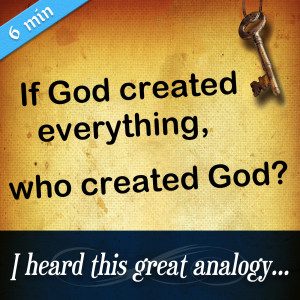
Thursday Feb 13, 2020
104. I Heard this Great Analogy - If God created everything, who created God?
Thursday Feb 13, 2020
Thursday Feb 13, 2020
If God created everything, who created God? To shine a light on the answer, consider your local railroad.
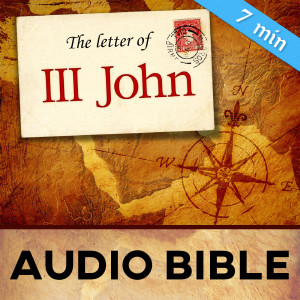
Monday Jan 20, 2020
99. Audio Bible - 3 John
Monday Jan 20, 2020
Monday Jan 20, 2020
Uh oh. Disagreement between Church leaders! 3 John is a very short (15 verses) letter from the New Testament.
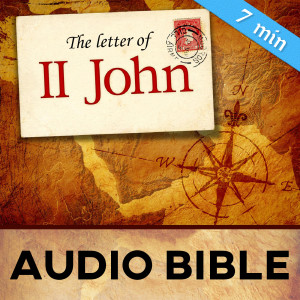
Tuesday Jan 14, 2020
98. Audio Bible - 2 John
Tuesday Jan 14, 2020
Tuesday Jan 14, 2020
2 John is incredibly short (13 verses) and reminds us that love = following Jesus' commandments. Also included are two recommendations to read the whole Bible in a year.
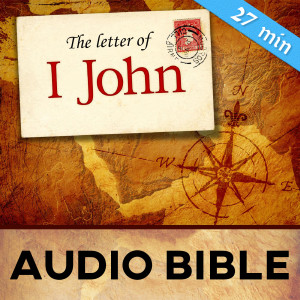
Thursday Jan 09, 2020
97. Audio Bible - 1 John
Thursday Jan 09, 2020
Thursday Jan 09, 2020
Light vs. darkness. Lies vs. truth. The World vs. the Father. Lawlessness vs. righteousness. Hatred vs. love. Words vs. deeds. Mortal sin vs. venial sin. 1 John has it all and is a beautiful letter that encourages and challenges.
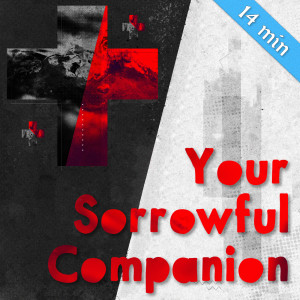
Friday Dec 13, 2019
88. Your Sorrowful Companion
Friday Dec 13, 2019
Friday Dec 13, 2019
The depth of our God's compassion - ability to suffer with - is revealed through a look at the Sorrowful Mysteries of the Rosary and the Stations of the Cross. And some bonus thoughts on "Why would a good God allow evil?"
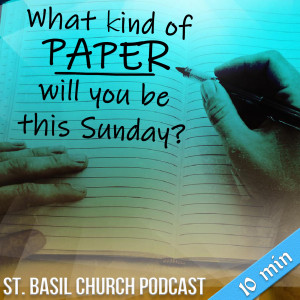
Friday Nov 15, 2019
82. What Kind of Paper will you be this Sunday?
Friday Nov 15, 2019
Friday Nov 15, 2019
A reflection on where wax paper, notebook paper, paper towels, and YOU fall on the absorbency spectrum.

Friday Nov 08, 2019
80. Reflections on the Guy Who Threatened My Life 3x Last Week
Friday Nov 08, 2019
Friday Nov 08, 2019
Parking Lot Rage is real! Director of Evangelization Tommy Dome shares spiritual lessons after reflecting on a peculiar parking lot incident that happened to him.

Thursday Sep 26, 2019
74. Feel Like You're Losing Your Faith? Here's how that could be a good thing
Thursday Sep 26, 2019
Thursday Sep 26, 2019
There are different causes for feeling distant from God - some of them good and some of them bad.
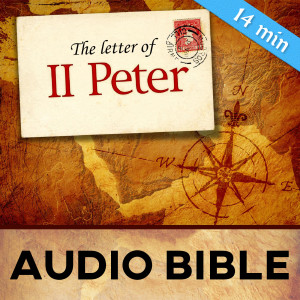
Friday Sep 20, 2019
72. Audio Bible - 2 Peter
Friday Sep 20, 2019
Friday Sep 20, 2019
BEWARE FALSE TEACHERS. That's a main lesson of the Biblical book of 2 Peter, among a few others. After 2 mins of background facts, the New Testament Letter of 2 Peter is read in full in just 10 mins.

Monday Sep 16, 2019
71. A Dead Guy Told Me to Get Rid of My Smartphone
Monday Sep 16, 2019
Monday Sep 16, 2019
Tommy Dome shares the story of when a heavenly voice urged him to make a very specific change in his life.
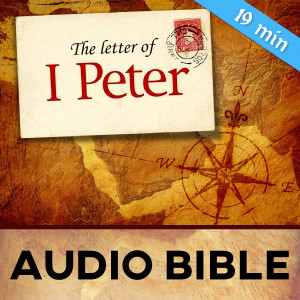
Friday Sep 13, 2019
70. Audio Bible - The Letter of 1 Peter
Friday Sep 13, 2019
Friday Sep 13, 2019
Practical advice and encouragement for undergoing suffering and persecution. After a minute of background facts about this book of the Bible, the New Testament Letter of 1 Peter is read in full.
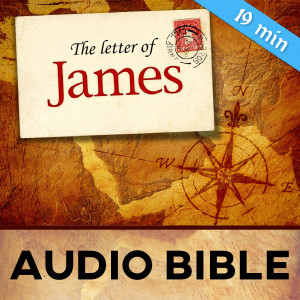
Friday Aug 30, 2019
67. Audio Bible - The Letter of James
Friday Aug 30, 2019
Friday Aug 30, 2019
After a minute of background facts about this book of the Bible, the New Testament Letter of James is read in full. Timeless wisdom and practical advice calls us out to live as better Christians.
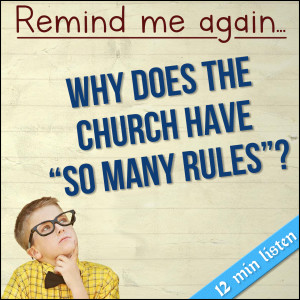
Friday Aug 02, 2019
62. Remind Me Again - Why does the Church have so many rules?
Friday Aug 02, 2019
Friday Aug 02, 2019
Why does the Church have "so many rules"? Can't I just follow my conscience, or the one Golden Rule? We dig behind the question and address what's really going on.

Saturday Jul 20, 2019
59. Remind Me Again...If Atheists Can be Good, Why be Religious?
Saturday Jul 20, 2019
Saturday Jul 20, 2019
Why should I bother being religious if unbelievers can be decent, honest people too?
The 5min video mentioned in this episode on the Moral Argument for God's existence can be viewed at http://bit.ly/MoralArgument
C.S. Lewis' short essay Man or Rabbit? mentioned in this episode can be read here.
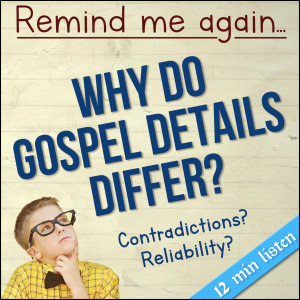
Thursday Jul 11, 2019
57. Remind Me Again.....Why Do Gospel Details Differ?
Thursday Jul 11, 2019
Thursday Jul 11, 2019
Some of the Gospels differ in minor details. Does this mean they are invalidated? Can we rely on the Bible at all?
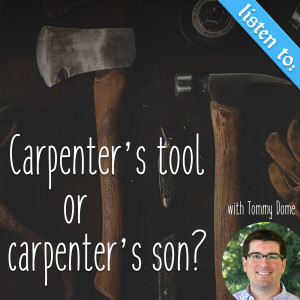
Thursday Jun 27, 2019
53. Carpenter's tool or Carpenter's son? w/ Tommy Dome
Thursday Jun 27, 2019
Thursday Jun 27, 2019
A small adjustment of direction can change the whole trajectory of a life. Tommy Dome spoke at the Gifts of the Spirit Women's Ministry, sharing stories of a few inflection points in his life that revealed more of who God is and who he is.

Friday Jun 14, 2019
51. Remind Me Again....Why do we say Jesus descended into Hell?
Friday Jun 14, 2019
Friday Jun 14, 2019
Every Sunday at Mass we say that Jesus descended into Hell. Sounds strange or wrong, doesn't it? Why would Jesus go to hell? The knots get untwisted using Scripture and the CCC in just 7 minutes.
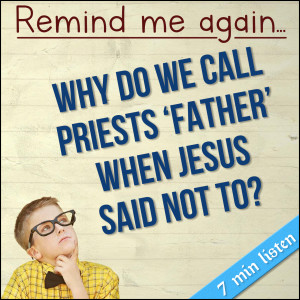
Tuesday Jun 04, 2019
48. Remind me again.....Why do we call priests "Father" when Jesus said not to?
Tuesday Jun 04, 2019
Tuesday Jun 04, 2019
Why do Catholics call their priests "Father", especially when Jesus Himself says in Matthew 23:9, "Call no one on earth your father..."?
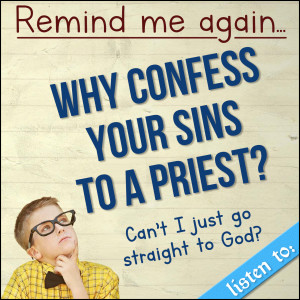
Tuesday May 21, 2019
43. Remind me again....Why Confess to a Priest? Can't I go straight to God?
Tuesday May 21, 2019
Tuesday May 21, 2019
"Remind Me Again..." is a new series briefly covering common topics and questions that you have asked yourself at some point. Share this episode so more people hear the answer. "Why confess my sins to a priest? Can't I just go straight to God?"

Tuesday Mar 26, 2019
30. Meaning of the Mass - Why is Mass called Mass?
Tuesday Mar 26, 2019
Tuesday Mar 26, 2019
Our word Mass comes from the Latin word missa, which is at the root of the dismissal that gives us our mission. The final blessing gives us that last dose of supernatural grace we need to fulfill our mission to bring souls to Jesus' Sacred Heart.
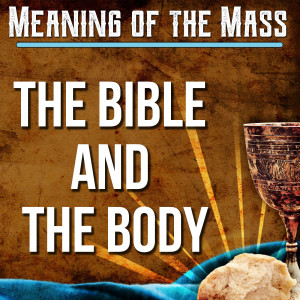
Wednesday Mar 20, 2019
28. Meaning of the Mass - The Bible and the Body
Wednesday Mar 20, 2019
Wednesday Mar 20, 2019
Why do we sit, why do we stand, and why do we fold our hands?
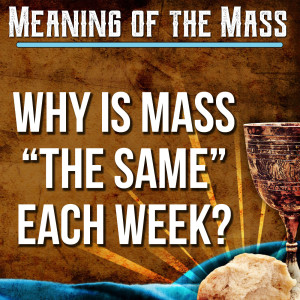
Sunday Mar 10, 2019
23. Meaning of the Mass - Why is Mass "the same" each week?
Sunday Mar 10, 2019
Sunday Mar 10, 2019
Way back in the year 155 AD, a man named Justin Martyr described something in writing. See if you can recognize what he was describing.
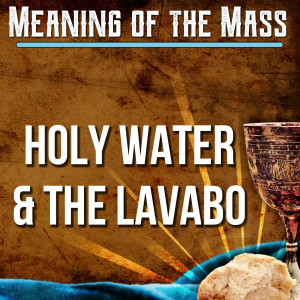
Monday Mar 04, 2019
22. Meaning of the Mass - Holy Water and the Lavabo
Monday Mar 04, 2019
Monday Mar 04, 2019
Holy Water fonts at the entrance to the Church bring to mind our Baptism, which is how we entered the Church, the spiritual Body of Christ. Dipping our fingers in a Holy Water and making the sign of the Cross is how we enter the Church the physical building. The action of the priest washing his hands goes back hundreds of years when it was a practical necessity to clean his hands after receiving all the community's various gifts during the offertory. Now we spiritualize that action and the priest prays for interior purification so that he can offer the sacrifice of the Eucharist with a pure mind, heart, and soul.
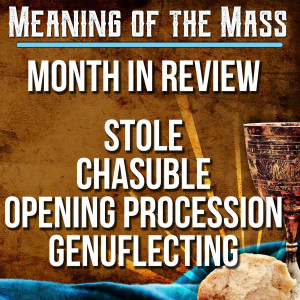
Sunday Feb 24, 2019
20. Meaning of the Mass - Review - Stole, Chasuble, Procession, Genuflecting
Sunday Feb 24, 2019
Sunday Feb 24, 2019
Very quick 2 sentence highlights of the past 4 topics - the Stole, Chasuble, Opening Procession, and Genuflecting.
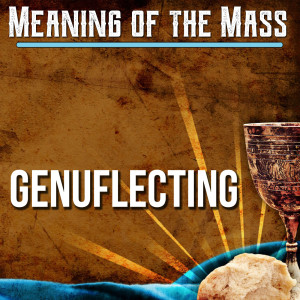
Sunday Feb 17, 2019
17. Meaning of the Mass - Genuflecting
Sunday Feb 17, 2019
Sunday Feb 17, 2019
Genuflecting is a sign of humility, an offering of service, and a proposal. Usually our souls lead our bodies to do the right thing, but sometimes we need our bodies to lead our souls to enter the right attitude for worship and prayer.
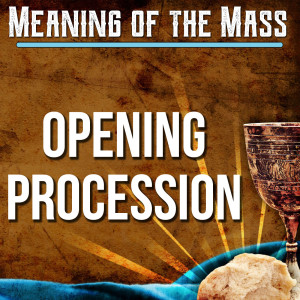
Sunday Feb 03, 2019
12. Meaning of the Mass - Opening Procession
Sunday Feb 03, 2019
Sunday Feb 03, 2019
The Opening Procession is a victory parade in which we are proud of what God has accomplished, and also a pilgrimage showing us our ultimate goal - reaching the table of the Heavenly Banquet. If we get on and stay on God's team, we'll reach it.
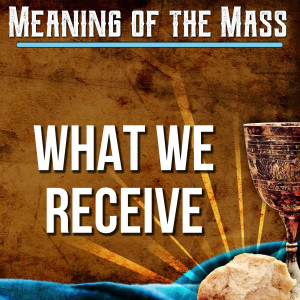
Monday Jan 28, 2019
10. Meaning of the Mass - What We Receive
Monday Jan 28, 2019
Monday Jan 28, 2019
We receive quite a lot!

Sunday Jan 20, 2019
9. Meaning of the Mass - The Chasuble
Sunday Jan 20, 2019
Sunday Jan 20, 2019
The Chasuble is the outermost vestment worn by the priest and the color corresponds to the liturgical season or the feast being celebrated. It also serves to hide the priest so we can more readily recognize that it is also Jesus at work.
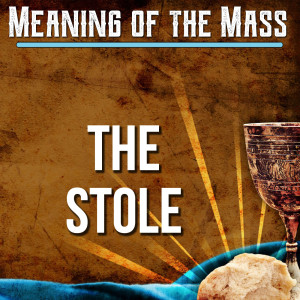
Sunday Jan 13, 2019
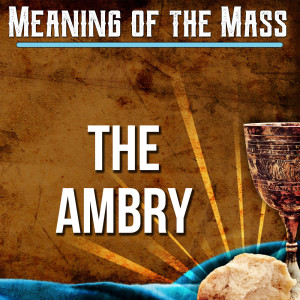
Monday Dec 31, 2018
5. Meaning of the Mass - The Ambry
Monday Dec 31, 2018
Monday Dec 31, 2018
2018-12-30. The Ambry is a compartment in the sanctuary that contains the 3 sacred oils. These oils are used in a variety of sacraments. The ambry is a visible reminder of the connection we have with those we love who are not at Mass because we are connected through the sacraments we both received that made us part of God's family - the Body of Christ.
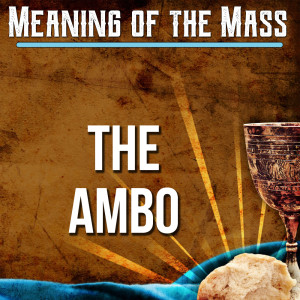
Monday Dec 31, 2018
4. Meaning of the Mass - The Ambo
Monday Dec 31, 2018
Monday Dec 31, 2018
2018-12-23. The ambo is the structure in the sanctuary from which the Biblical readings are proclaimed. Like the altar, it is also a table. Whereas the altar feeds us the Bread of Life, the ambo feeds us the word of life. We need both. Before the Gospel is proclaimed, we make a triple sign of the cross on our foreheads, lips, and hearts. The prayer we can pray at that time is "May the word of the Lord be on my mind, on my lips, and in my heart."
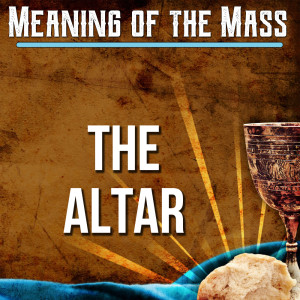
Monday Dec 31, 2018
3. Meaning of the Mass - The Altar
Monday Dec 31, 2018
Monday Dec 31, 2018
2018-12-16. The Altar is (1) a symbol of Christ, (2) a table for a meal, and (3) an altar for sacrifice. We bow and the priest kisses the altar because it's a symbol of Christ. It's a table just like Jesus had at the Last Supper when He instituted the Eucharist. It's an altar for sacrifice where we place our whole selves to offer to God in union with Jesus' sacrifice to the Father.
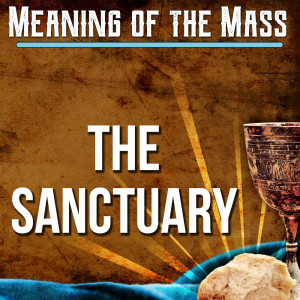
Monday Dec 31, 2018
2. Meaning of the Mass - The Sanctuary
Monday Dec 31, 2018
Monday Dec 31, 2018
2018-12-9. The Sanctuary is the place that is (1) set apart, (2) holy, and (3) where God dwells. This floorplan of our church tells the story of the Christian faith and of our lives since we start with separation but then move into union.
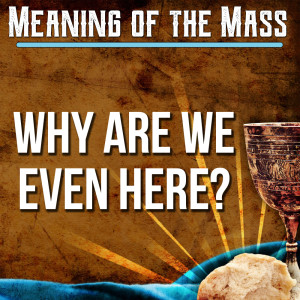
Monday Dec 31, 2018
1. Meaning of the Mass - Why are we even here?
Monday Dec 31, 2018
Monday Dec 31, 2018
There are a lot of reasons we come to Mass, but God has a reason why we're here too. 2018-12-2

